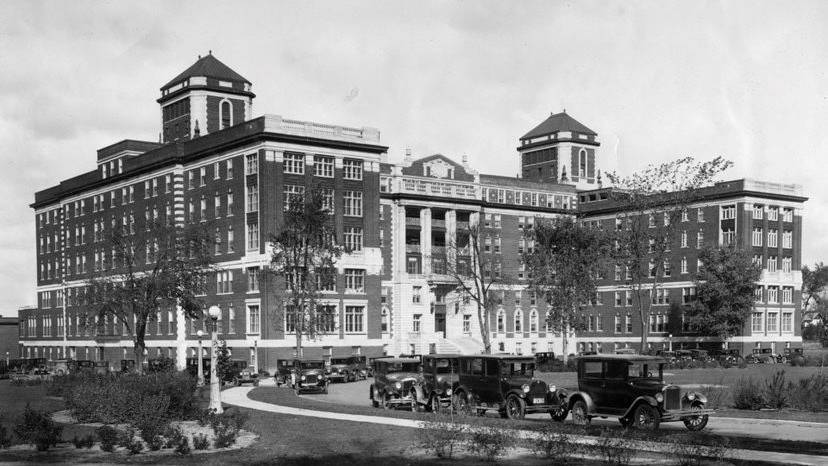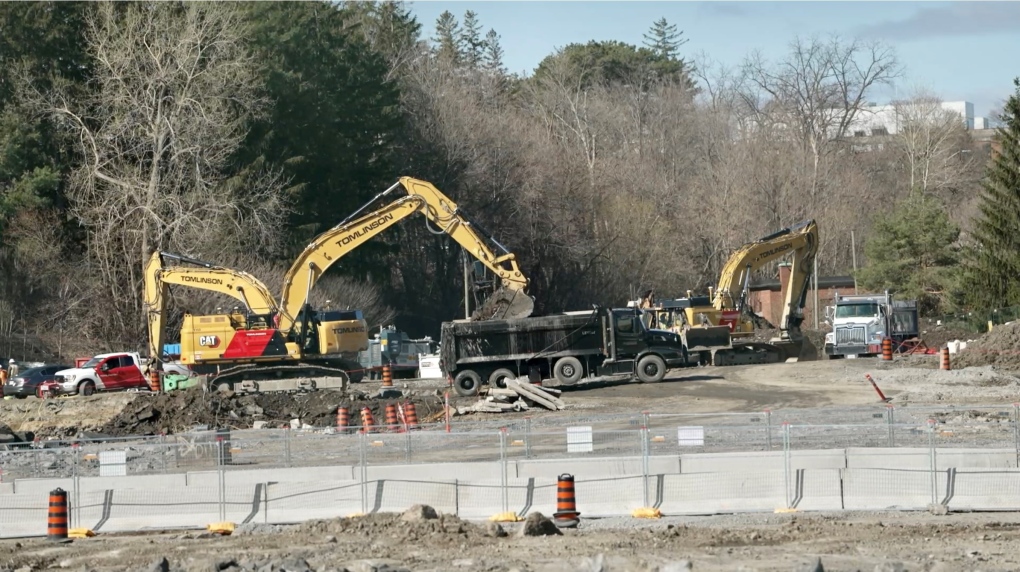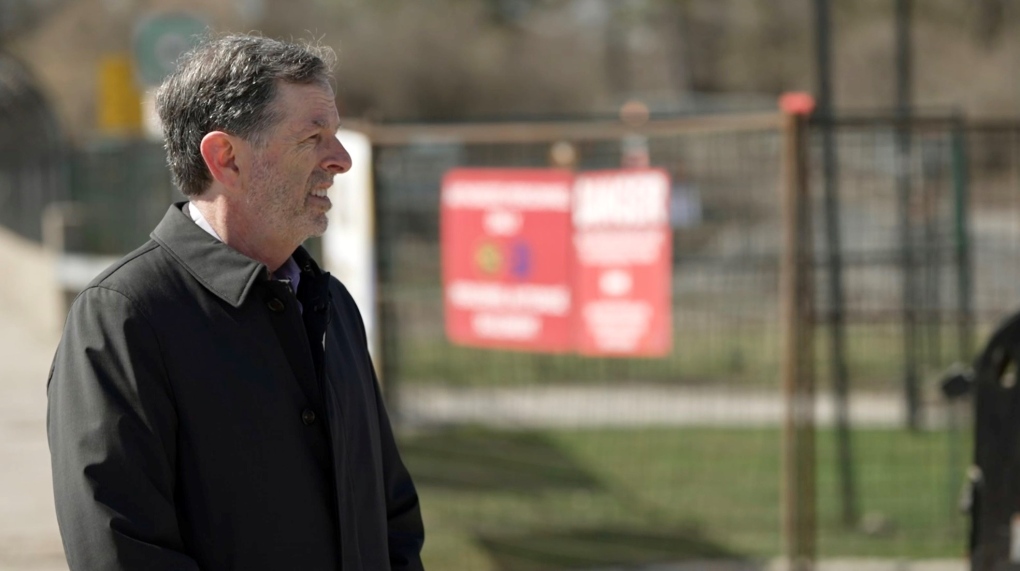Historic Civic Hospital fundraising campaign surpasses halfway point
A year since its launch, the Campaign to Create Tomorrow—the largest fundraising initiative in our city’s history to build the new Civic Campus of the Ottawa Hospital—has raised more than half of its $500 million goal.
“I’m thrilled to announce that as of today we’re at $268 million,” said Campaign Chair, Roger Greenberg.
Donors, Greenberg said, have been more generous than ever, showing fervent support for a new campus, leading-edge research and life-sciences park.
“I would say the majority of people, including my own family, have given multiples of their normal giving. They realize what this will bring to the community in terms of its impact on healthcare,” he said.
It was shortly after the First World War when Ottawa’s former mayor, Harold Fisher, had a progressive vision for the future of medicine in the capital.
With the world in the grip of a global influenza pandemic, Fisher pushed for the construction of the Ottawa Civic Hospital, opening the doors to a century of incomparable healthcare in the city.
Today, however, Fisher’s once state-of-the-art facility is challenged to meet the needs of future generations.
“The building is past its due date,” said Greenberg.
“People may not realize it but the original building that was built in 1923 has had twenty-one additional buildings grafted on to it. There’s no space to expand.”
 An early photo of the Ottawa Civic Hospital (supplied)
An early photo of the Ottawa Civic Hospital (supplied)
Now a new vision for the Civic is taking shape, fueled by passionate Ottawa residents like Greenberg. He was born at the Civic, along with his parents, five siblings and two of his three children.
It’s the same hospital where many of his family members and friends have said their good-byes.
“If you look back over time at your core moments of happiness and sadness, it’s been at the Civic Hospital,” Greenberg said.
Construction has begun on a 2,500-vehicle parking garage, ultimately for hospital staff, patients and visitors. In the short term, it will be used by work crews building the new hospital.
 Crews are busy with the first stage of construction. They’re building a 3500 vehicle parking garage. (Joel Haslam CTV Ottawa)
Crews are busy with the first stage of construction. They’re building a 3500 vehicle parking garage. (Joel Haslam CTV Ottawa)
“So they need a place to park and we’re building what is one of the key fundamentals of the hospital which is adequate parking for everyone, once it opens. The hope is to finish the garage in about 18 months, or so. And then work will start on the main hospital building, in late 2024 or early 2025.”
The hospital will strive to be more patient-centred than ever.
Greenberg says double, triple and quadruple beds in a room will be a thing of the past. Every room, and there will be more of them, will be single-occupancy.
“That might sound like an extravagance, but it isn’t,” said Greenberg.
“When you have a pandemic, every one of those rooms can be turned into their own little isolation ward because they’ll have everything that the patient needs to have and they’ll also have an area for family who are coming to visit and take care of them, so they can be there with their own family member, or a caregiver, if you want to bring someone extra in, as well,” he said.
The scope of the project’s economic impact is massive.
“This will end up creating thousands of new jobs and well-paying jobs for residents of Ottawa.”
 Roger Greenberg, Chair of the Campaign to Create Tomorrrow, surveys the early stages of construction. Since launching one year ago, Greenberg and his team have raised $268 million of the campaign’s $500 million fundraising goal. (Joel Haslam CTV Ottawa)
Roger Greenberg, Chair of the Campaign to Create Tomorrrow, surveys the early stages of construction. Since launching one year ago, Greenberg and his team have raised $268 million of the campaign’s $500 million fundraising goal. (Joel Haslam CTV Ottawa)
Despite the success of the campaign after its first year, Greenberg says raising the remaining $232 million will require a great deal of work and support.
“Our campaign slogan is ‘It’s time,’” he said.
“We’ve been waiting for this moment for a long time, and many of us are never going to see this moment again. Now’s the time to make a commitment.”
“At $232 million, that itself is bigger than any other campaign in the city’s history. It’s great we’ve had this success, but we can’t rest on our laurels. There’s still lots of work to do.”
CTVNews.ca Top Stories

'It could be catastrophic': Woman says natural supplement contained hidden painkiller drug
A Manitoba woman thought she found a miracle natural supplement, but said a hidden ingredient wreaked havoc on her health.
After hearing thousands of last words, this hospital chaplain has advice for the living
Hospital chaplain J.S. Park opens up about death, grief and hearing thousands of last words, and shares his advice for the living.
WHO likely to issue wider alert on contaminated cough syrup
The World Health Organization is likely to issue a wider warning about contaminated Johnson and Johnson-made children's cough syrup found in Nigeria last week, it said in an email.
WATCH Video shows dramatic police takedown of carjacking suspects chased through parking lot north of Toronto
Police have released video footage of a dramatic takedown of a group of teens wanted in connection with an attempted carjacking in Markham earlier this month.
Canada, G7 urge 'all parties' to de-escalate in growing Mideast conflict
Canada called for 'all parties' to de-escalate rising tensions in the Mideast following an apparent Israeli drone attack against Iran overnight.
'It was all my savings': Ontario woman loses $15K to fake Walmart job scam
A woman who recently moved to Canada from India was searching for a job when she got caught in an online job scam and lost $15,000.
Families to receive Canada Child Benefit payment on Friday
More money will land in the pockets of some Canadian families on Friday for the latest Canada Child Benefit installment.
After COVID, WHO defines disease spread 'through air'
The World Health Organization and around 500 experts have agreed for the first time on what it means for a disease to spread through the air, in a bid to avoid the confusion early in the COVID-19 pandemic that some scientists have said cost lives.
American millionaire Jonathan Lehrer denied bail after being charged with killing Canadian couple
American millionaire Jonathan Lehrer, one of two men charged in the killings of a Canadian couple in Dominica, has been denied bail.































